If you’re wondering how to do keyword research for affiliate marketing…
This post is for you!
Because in this post, I’ll show you (exactly) how to do keyword research to find the perfect keywords.
Furthermore:
We’ll also look at some examples, so you have a game plan you can action right away.
Ready?
Let’s do it…
What Is Keyword Research?
Keyword research is the process of researching keywords/phrases people enter into search engines such as Google.
The purpose is to find popular keywords that enough people are searching for.
Then to strategically include those keywords within content you would like ranked on Google.
How To Do Keyword Research For Affiliate Marketing
(A Beginners Guide + Examples)
Step 1: Create A List Of Niche Topics
The first step to keyword research is to come up with niche topics.
“Niche topics” are topics your audience is interested in, that relate to your main niche.
For example:
The niche I’m in is the affiliate marketing niche.
There are many niche topics that fall within that niche.
Such as:
- List building
- Keyword research
- Traffic generation
- Blogging
- Email marketing
- SEO
- Conversions
- Optimization techniques
- Copywriting
With niche topics, it’s easier to find keywords.
Far easier than finding keywords around your general niche.
Even more:
You increase the number of keywords you can target and rank for.
So, your first step to keyword research is to come up with a list of niche topics.
And the best way to come up with niche topics is to brainstorm.
When you brainstorm, you’ll want to add the niche topics you come up with into a spreadsheet.
You can do this with Google Docs.
Here’s an example of niche topics I’ve come up with around “learning karate,” a topic I know nothing about:
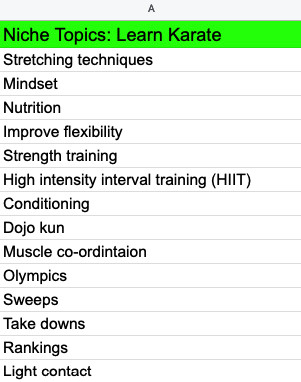
You should aim to come up with a list of 5-10+ different niche topics.
Step 2: Research Keywords
In this step, you’ll turn your niche topics into keywords.
How?
By using a keyword research tool known as UberSuggest.
Head to UberSuggest and enter one of your niche topics into the Enter A Domain Or Keyword section.
Then, click the Search button:
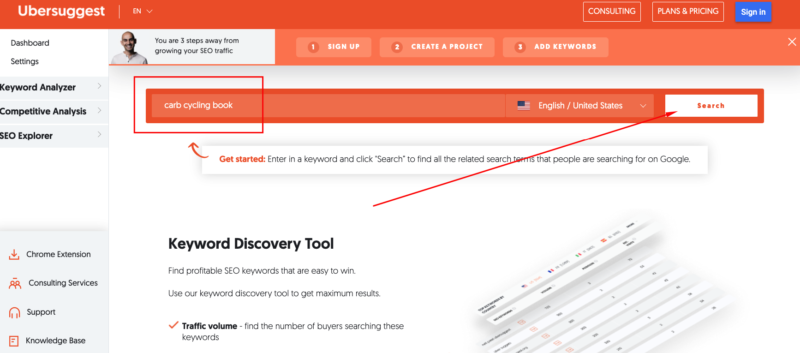
Next, click the Keyword Ideas tab on the left hand side of the page:
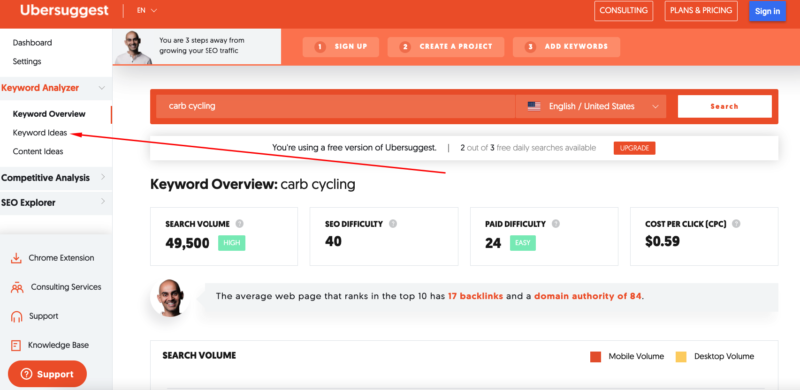
That’s going to show a list of related keywords, along with the monthly search volume for each keyword:
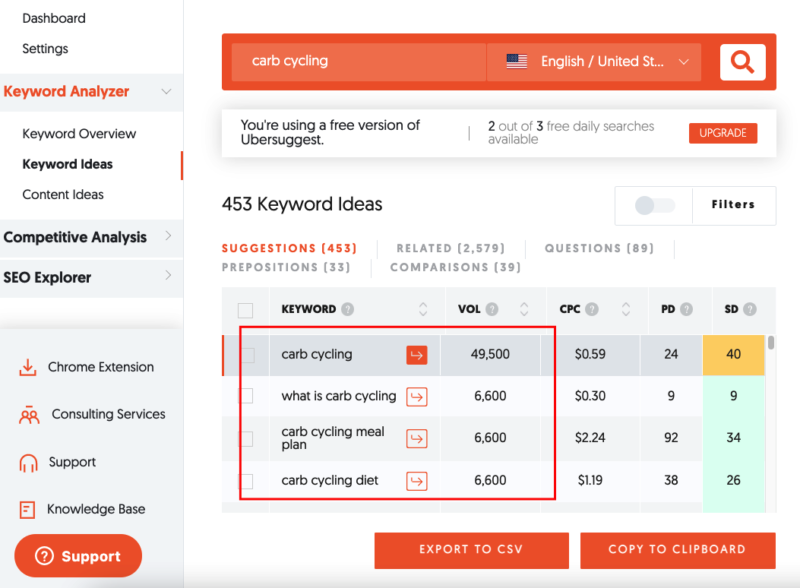
UberSuggest is an awesome tool for finding keywords.
With the list of keywords you’ll be shown, you can then do another search for each of those keywords.
The more keywords you enter into the search box, the more answers and keywords you’ll be shown.
You then need to evaluate each keyword based on these three criteria:
1: Monthly Search Volume
The higher the search volume the better.
However:
More often than not, you’ll want to go after keywords with a search volume of 100-1k and/or 0-100.
Keywords that have 10k-100k search volumes tend to be very competitive.
2: Commercial Intent
This is where you determine the “profit potential” of a keyword.
Not all keywords will make you money, or provide you with leads.
Which, are the only types of keywords you should be interested in.
We’ll cover commercial intent in more detail soon.
3: Competition
You’ll want to do a search in Google for keywords that “tick the boxes.”
Why?
Because you need to see who is already ranking for that keyword.
So…
Check the different keywords you’re given for search volume. (100-1k or 0-100 is best)
Then, do a Google search for those keywords, and take a look at the sites ranking for those keywords.
You need to get a “feel” for whether you can outrank them.
If you think you can, and the monthly search volume is good, those keywords should get added into another column within your spreadsheet.
When you’ve searched through all keywords for your niche topics, you should have a decent size list of potential keywords.
You need to come up with at least 150-200+ keywords, but more is better.
Step 3: Look For Long Tail Keywords
There are three main categories you can divide keywords into:
- Head keywords
- Body keywords
- Long tail keywords
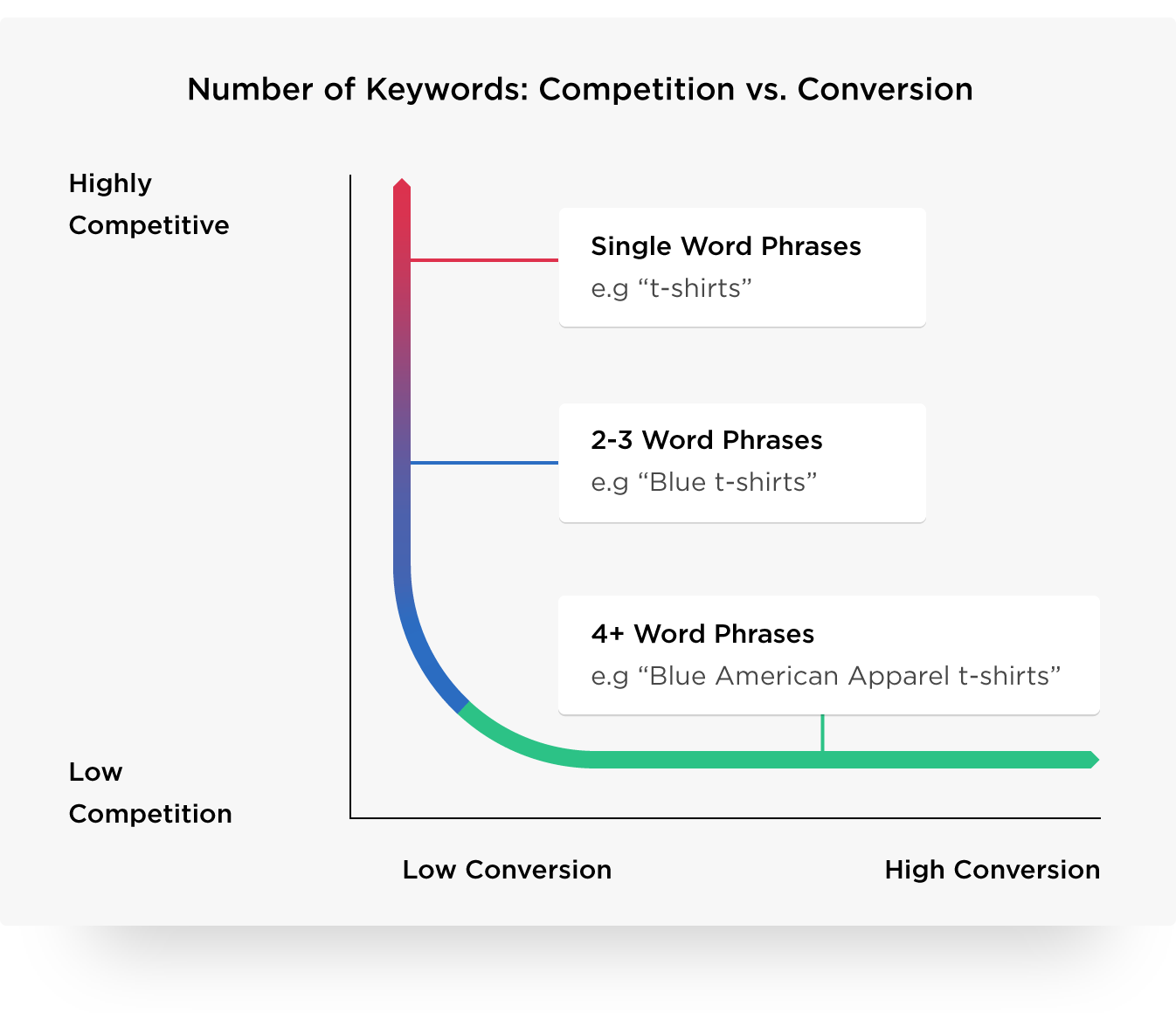
[Image Source: Backlinko]
Here’s a break down of each keyword category, and how they relate to keyword research…
1: Head keywords
Head keywords are single word phrases such as “marketing” or “nutrition.”
These keywords have the highest search volume and the most competition.
They’re also non specific phrases.
2: Body keywords
Body keywords are 2-3 word phrases such as “online marketing” or “optimum nutrition.”
These keywords tend to have less search volume than head keywords, but they’re more specific, with less competition.
3: Long Tail keywords
Long tail keywords are 4+ word phrases that are very specific.
Such phrases might be “best online marketing training for beginners.”
Or, “optimum nutrition for men over 35.”
Or, “how to find keywords for affiliate marketing.”
With those types of phrases, the searchers intent is clear.
Long tail keywords don’t get as much search volume as head or body keywords.
But, when you target many long tail keywords, they add up to a lot of search volume.
They’re also less competitive, and much easier to convert into customers/leads.
When searching for keywords, go after long tail and body keywords.
UberSuggest does a great job of showing long tail keywords.
However, you can also use these 2 sites to find even more long tail keywords:
1: Google
This is a goldmine for finding long tail keywords.
Here’s how it works:
Do a Google search for your keywords you’ve found from UberSuggest.
Then, scroll down to the bottom of the page and you’ll see a Searches Related To area:
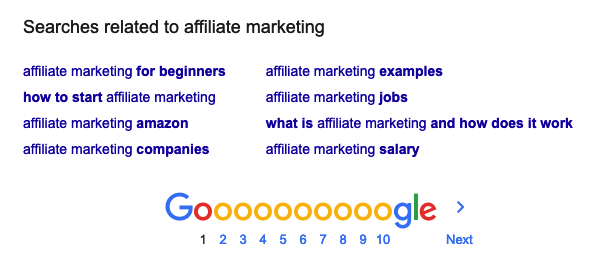
Those are long tail keywords people are searching for in Google.
You can then take one of those keywords and do a search for that keyword.
Be sure to also enter these keywords into UberSuggest, so you can check the monthly search volumes.
2: Quora
Quora is a Q&A website, where people can ask questions, and the community (anyone) can answer those questions.
It’s an awesome tool you can use to find long tail keywords.
Here’s how it works:
First, head to Quora, then enter a question or keyword into the search box at the top of the page.
Then, hit enter:

Quora will show a list of questions related to the term you’ve entered.
These can be used as niche topics, and for long tail keywords:

Check out the different questions being asked by scrolling down the page.
If you see questions that might be a good fit for a long tail keyword, enter that keyword into UberSuggest to check monthly search volumes.
Step 4: Check The Popularity Of Your Keywords
To check the popularity of your keywords, you can use Google Trends.
Google Trends will show the popularity of your keywords over time.
This is information you need to know.
Because you may find keywords that tick all the boxes, but those keywords are only searched for once a year.
That’s not good.
You want keywords where there’s searches regularly.
Here’s how it works:
Head to Google Trends.
Enter a keyword (or topic) into the search box and hit enter:
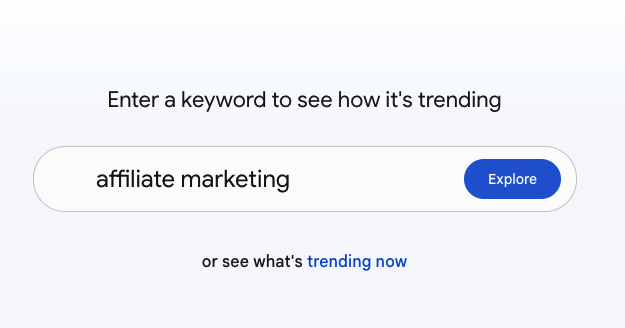
Next, set the search filter to Worldwide and 5 years, then view the graph to see the popularity of your keyword:
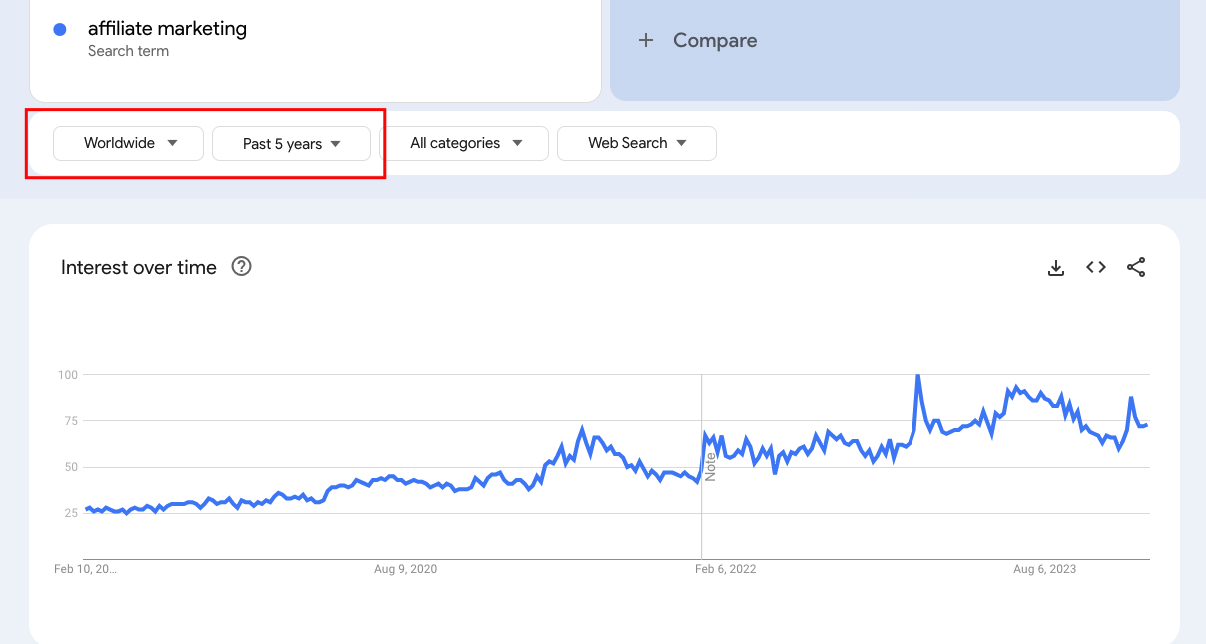
You need the graph to be “steady” or “climbing” over time for your keywords.
If it’s not, search for a related keyword to see if that keyword shows different results.
Google Trends also shows a Related Topics area at the bottom of the page:
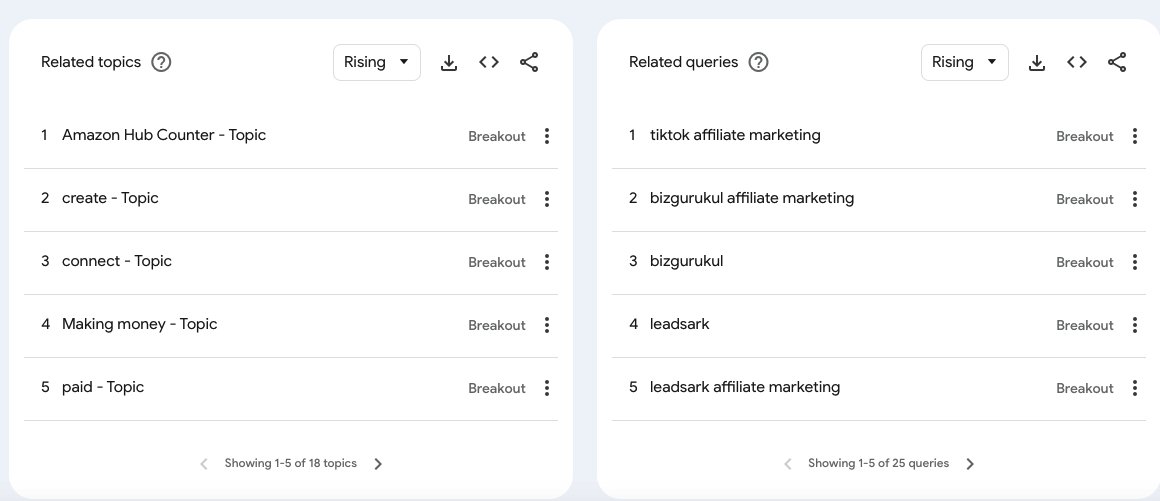
This is great for more niche topics.
Or, to find even more long tail keywords.
By using these tools, it will help you come up with a huge list of long tail keywords that have long term potential.
Step 5: Check A Keywords Commercial Intent
In simple terms, commercial intent refers to the “profit potential” of keywords.
Not all keywords are equal.
Some have potential to make money, or to provide leads.
While others have no potential to provide either.
There are four main types of commercial intent that make up all keywords:
- Informational keywords
- Navigational keywords
- Buy now keywords
- Freebie keywords
Let’s go over each of these, so you understand how they work, and why they’re important.
1: Informational Keywords
An informational keyword is a type of keyword where the searcher is looking for information on a specific topic or product etc.
Normally, it would be a “how to do” or “how to achieve” type of search phrase.
An example of this type of keyword could be:
“How to perform an autorotation in a helicopter”
2: Navigational Keywords
These types of keywords are used when a searcher is looking for information on how to get somewhere.
Or, to find a specific location.
For example:
“What’s the nearest Italian restaurant to my current location”
Or:
“The quickest route to get from A to B in a car”
3: Buy Now Keywords
A buy now keyword is used when a searcher knows what they’re looking for, and they’re ready to make a purchase.
An example for this type of keyword could be:
“Where can I buy the latest air jordan shoes online”
Or:
“The best web hosting for my new website“
4: Freebie Keywords
A freebie keyword is where the searcher is looking for something that’s free.
More often than not, they’re “freebie seekers.”
Here’s an example of this type of keyword:
“Free microsoft powerpoint cracked version”
Or:
“Download free movies”
The types of keywords you should target are informational and buy now keywords.
And depending on your niche, navigational keywords.
Stay clear of “freebie seeker keywords,” because it will be hard to convert those people into buyers.
By determining a keywords commercial intent, you get insights into whether the keyword is being searched for from buyers.
Or from leads, who you can convert into buyers over time.
Step 6: Check Keyword Competition
Each step in the keyword research process is important.
But this step is really, really important.
This is where you do a search in Google for each of your keywords that have passed the “checks” so far.
Here’s why you need to do this:
Suppose you have a bunch of keywords with good commercial intent etc.
You may end up trying to rank for keywords, only to find out, you’re competing against people you have no chance of ever outranking.
And, you may find this out months or even years later.
If you can’t outrank those on the first page of the search engines…
There’s no point trying.
If the best you can do is get on to the second page, you’ll never get traffic.
Because nobody looks past the first page.
The good thing is, it’s quick and easy to check keyword competition.
Here’s how to do it:
First, you will need to download a free SEO tool by UberSuggest, which you can do here.
When UberSuggest is active, it’s going to show you a sites domain authority in the search listings:
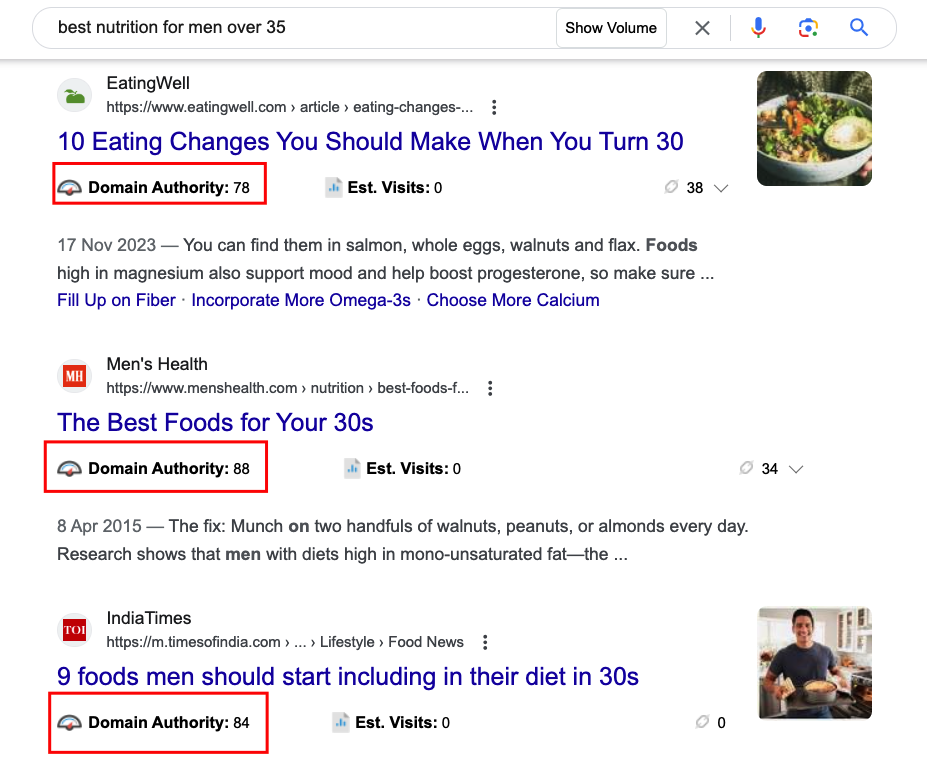
Domain authority is a number from 0-100.
The higher the number, the more authoritative the site is.
You want to target keywords where all the sites on the first page have low DA. (40 or below.)
This gives you a chance to rank on the first page too, but without it taking forever to get there.
As your site becomes more established though, then you can go after those really competitive keywords.
Recap Of How To Do
Keyword Research For Affiliate Marketing
Step 1: Create a list of niche topics
Step 2: Research keywords that relate to your niche topics
Step 3: Look for long tail keywords you can target
Step 4: See how popular your keywords are
Step 5: Check your keywords commercial intent
Step 6: Use Google to look at your competition
Conclusion
And there we are.
How to do keyword research for affiliate marketing.
Doing keyword research will take some time.
It does require research so you can get valid data.
But, it’s much easier to do the research first, then it is to target a keyword you have no hope for.
Now, over to you…
“Are you confident you can do keyword research?”
Leave a comment and let me know.
I’d love to hear from you!





Hey,
I’m starting out a affiliate Blog( complete beginner)🤪.
Topic/Niche- Backpack ( particularly about school and college bags).
But during keywords research I found that some keywords have low KD(keyword Difficulty).
However, In the SERP page all the websites that are ranking are either commerce or specific bagpack related companies website that have high DA.
So, it is good to start a blog with kind of situation.
Or you suggest something else.
Please reply.
Thank You 😀
However, I have got certain keys from this blog but this query has crushing me day by day.
Help me out 😥
Hey Mathew,
Your topic shouldn’t be about “backpacks” as such.
That’s more about a thing as opposed to a (broad) topic.
Instead, you could focus on something a little more broad such as “schooling” or “learning” then cover the topic of backpacks as a blog post(s).
This will give you more topics to blog about, as opposed to blogging JUST about backpacks.
Make sense?
Hope this helps.
Cheers,
Josh
P.S.
You can still definitely target keywords related to backpacks, even if the top ranking pages in the SERPS have high DA.
That’s because that wouldn’t (or shouldn’t) be your core focus/topic.
Ultimately, focusing on a broader topic will give you the opportunity to rank those pages high, then over time, your backpack posts stand a chance of competing against those high in the SERPS currently.
I’m thinking of Amazon affiliate. Please note that I’m a newbie though I’ll have to go ahead. I found it helpful.
Hey Khalil,
Definitely go ahead with Amazon.
They have a huge range of products you can promote.
Let me know how you get on.
Josh,